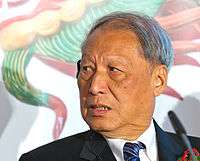Cheng Siwei
| Cheng Siwei 成思危 | |
|---|---|
|
Cheng Siwei at the World Economic Forum in September 2008 | |
| President of the China Democratic National Construction Association | |
|
In office 1996–2007 | |
| Preceded by | Sun Mengqi |
| Succeeded by | Chen Changzhi |
| Vice Chairman of the Standing Committee of the National People's Congress | |
|
In office 1998–2008 | |
| Chairman | Li Peng → Wu Bangguo |
| Personal details | |
| Born |
June 1935 Xiangxiang, Hunan, China |
| Died |
12 July 2015 (aged 80) Beijing, China |
| Political party | China Democratic National Construction Association |
| Parents |
Cheng Shewo Xiao Zongrang (萧宗让) |
| Alma mater | |
| Profession | Science of Business Administration |
Cheng Siwei (June 1935 – 12 July 2015) was a Chinese economist, chemical engineer and politician. He was the Chairman of China Soft Science Research Association;[1] President of the Chinese Society for Management Modernization; Director of the Research Center on Fictitious Economy and Data Science, Chinese Academy of Sciences; Dean of the School of Management of the Graduate University of the Chinese Academy of Sciences[1] and Honorary President of East China University of Science and Technology.
He was also an Adjunct Professor and Doctoral Supervisor of institutions including the Chinese Academy of Sciences, Chinese Academy of Social Sciences, Guanghua School of Management of Peking University, and Nankai University.[2]
Early life and education
Cheng Siwei was born June 1935, in Xiangxiang, Hunan Province, China. He attended Heung To Middle School in Hong Kong from 1948–1951; he then moved to Mainland China. During 1951-1952 he attended the Workers' College of Guangzhou South University, China. He then attended the South China Institute of Technology and East China Institute of Chemical Technology from 1952–1956, majoring in inorganic chemical technology, and from 1958-1973 he worked in various units of both the Ministry of Chemical Industry and the Ministry of Petroleum and Chemical Industries.[3]
Career

He was the Chief Engineer of the Science & Technology Bureau of the Ministry of Chemical Industry (China) from 1973-1981. In 1981 he attended the University of California, Los Angeles, and graduated in 1984 with a Master of Business Administration (MBA). He then returned to his former position as Chief Engineer of the Science & Technology Bureau of the Ministry of Chemical Industry until 1988, when he was promoted to the Vice-President and Chief Engineer of the Scientific and Technical Research Institute of the Ministry of Chemical Industry. He became the Deputy Chief Engineer of the Ministry of Chemical Industry in 1993 and Vice-Minister of Chemical Industry from 1994-1997. During the same period, he held the position of the Chairman of the China Democratic National Construction Association (CDNCA) Central Committee, from 1996-1997. He continued to hold dual positions for nearly ten years, as the Chairman of the 7th and 8th Central Committees of the Chairman of the China Democratic National Construction Association (CDNCA) from 1997–2007, and as the Vice-Chairman of the Standing Committee of the Ninth and Tenth National People’s Congresses from 1998-2008. During this time, he was also awarded an Honorary Doctor of Business Administration from Hong Kong Polytechnic University.[1][2][3]
Academics
His research mainly covers complexity science, fictitious economy, venture capital, chemical systems engineering, soft science and management science.
He has published several books, including Chromic Salts Technology, Rejuvenating Chemical Industry through Science and Technology, Soft Science and Reform, Large Linear Target Programming and Application, Research in China's Economic Development and Reform and Economic Reform and Development in China. In 2010, he began having his works translated into English and published through Enrich Professional Publishing[4] [5] in Hong Kong, for a worldwide readership. The books Selected Works of Cheng Siwei, Economic Reforms and Development in China: Three-Volume Set[4][6][5] are some of his most recent works. He has nearly 300 publications under his name at home and abroad.[3]
In recent years, he has devoted himself to the use of complexity science to study issues relating to the development and reform of China, made enormous efforts to explore and explain the characteristics and law of development of the fictitious economy, and actively studied and promoted the development of venture capital in China. The Brookings Institution has hosted him as a speaker in an effort to find out more about China's 12th 5-year-plan, including its top-level policy objectives.
Death
Cheng Siwei died in Beijing on the morning of 12 July 2015 at the age of 80.[7][8]
Published works
- Chromic Salts Technology
- Rejuvenating Chemical Industry through Science and Technology
- Soft Science and Reform
- Large Linear Target Programming and Application Reform
- The U.S. Financial Crisis: Analysis and Interpretation. San Francisco: Long River Press, 2012. ISBN 978-1-59265-147-4
- Selected Works of Cheng Siwei, Economic Reforms and Development in China: Three-Volume Set [4][5]
- Siwei Cheng (2013). Financial Reforms and Developments in China. Hackensack, New Jersey: World Scientific. p. 616. ISBN 978-981-4317-54-2.
References
| Wikimedia Commons has media related to Cheng Siwei. |
- 1 2 3 Cheng, Siwei. "Graduate School of the Chinese Academy of Sciences". Retrieved 2 January 2012.
- 1 2 Cheng, Siwei. "Biography of Cheng Siwei". Retrieved 2 January 2012.
- 1 2 3 Cheng, Siwei. "MBA Library". Retrieved 2 January 2012.
- 1 2 3 Cheng, Siwei. "Enrich Selected Works of Cheng Siwei". Retrieved 2 January 2012.
- 1 2 3 "2102 Economic Reforms & Development in China & Book Launch", China's Sina News, Jan 6, 2012
- ↑ Cheng, Siwei. "Selected Works of Cheng Siwei". Retrieved 2 January 2012.
- ↑ "Chinese economist Cheng Siwei dies at 80". ECNS.CN. Retrieved 12 July 2015.
- ↑ http://www.scmp.com/news/china/policies-politics/article/1838243/cheng-siwei-chemist-who-became-chinas-venture-capital
